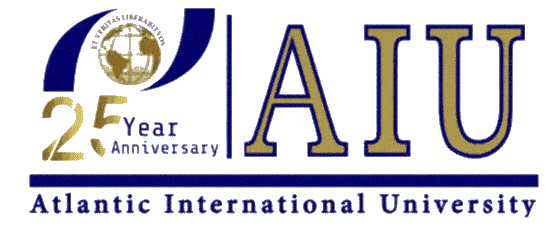Doctor of Finance (PhD)
School of Business and Economics
Academic Freedom to Discover Your Purpose
Open Curriculum Design at Atlantic International University
The Doctor of Finance (Ph.D.) program is an advanced academic pursuit that aims to produce top-quality scholars ready for successful academic careers. It’s designed to deepen understanding in theoretical modeling and empirical testing within finance. This program covers core areas like asset pricing, investments, corporate finance, and financial intermediation, ensuring a comprehensive understanding of finance.
AIU’s Doctorate degree in Finance adds a unique dimension by incorporating computer science elements, allowing students to blend finance with technology. This approach is particularly relevant in today’s data-driven world, where finance increasingly intersects with tech innovations.
Additionally, AIU’s approach to distance learning in this field is notably flexible. The Doctorate program in Chemical Engineering, for instance, exemplifies this flexibility. It’s custom-designed for each student, diverging from the one-size-fits-all model seen in traditional programs. This tailored approach means that each student’s curriculum is unique, focusing on their specific interests and professional goals, rather than mandating a standard set of subjects and materials.
This customizability is a significant advantage for professionals looking to advance in their field while accommodating their individual learning styles and career objectives. By offering a program that adapts to each student’s needs, AIU provides an educational experience that is both deeply personal and professionally enriching.
Courses and Topics in Doctorate in Finance
The Doctorate in Finance program, such as the one offered by AIU, encompasses a variety of courses and topics designed to equip students with a comprehensive understanding of finance, along with a unique integration of computer science. The course delves into the role of financial institutions in the economy, studying banks, insurance companies, pension funds, and the regulation of these entities.
Students explore key areas of computer science that are relevant to finance, such as data analysis, algorithmic trading, financial modeling using programming languages (e.g., Python or R), and machine learning applications in finance.
Emphasis on theoretical modeling and empirical testing, teaching students how to conduct rigorous research, analyze financial data, and contribute new insights to the field of finance. Given the program’s flexibility, students can choose to specialize in niche areas within finance or intersecting disciplines, guided by their interests and career aspirations.
A significant component of the doctorate program, where students undertake original research on a topic of their choice, contributing new knowledge to the field of finance. The curriculum is indicative of the broad and deep learning experience students can expect in a Doctorate in Finance program, especially in an institution like AIU that prioritizes personalized education paths and integrates cross-disciplinary knowledge.
Economic Statistics
Microeconomic Theory
Financial Economics
Empirical Applications in Finance
Econometrics
Theory of Finance
Mathematics for Economists
Time Series Analysis
Methods and Computation
Macroeconomics and Finance
Statistical Methods
Linear Statistical Models

Orientation Course
The foundational orientation courses at AIU for the Doctorate in Finance are crucial in setting the stage for a smooth transition into the program. They provide students with vital tools and knowledge, offering multiple benefits. These courses acquaint students with the program’s framework, curriculum, and what is expected of them, aiding in effective navigation from the start of their academic path. They also promote interactions among students, nurturing a community spirit and collaborative environment, even in an online setting. Establishing connections with peers and faculty is key to enriching the learning experience.
An essential part of these courses is the introduction to various academic support resources. This encompasses access to online libraries, academic assistance services, and technological tools vital for their studies. Furthermore, they provide detailed explanations of academic policies, evaluation methods, grading systems, and other procedural details crucial for a smooth academic journey in the program.
- Communication & Investigation (Comprehensive Resume)
- Organization Theory (Portfolio)
- Experiential Learning (Autobiography)
- Academic Evaluation (Questionnaire)
- Fundament of Knowledge (Integration Chart)
- Fundamental Principles I (Philosophy of Education)
- Professional Evaluation (Self Evaluation Matrix)
- Development of Graduate Study (Guarantee of an Academic Degree)
Research Projects in Doctorate in Finance
Research projects in a Doctorate in Finance program are central to the doctoral experience, reflecting a culmination of the students’ learning and exploration in the field. They focus on areas such as; on areas like asset pricing, corporate finance, financial intermediation, and investments. These projects are typically extensive, deeply analytical, and aim to contribute new insights or developments in the field of finance. They also involve intensive data analysis, theoretical modeling, and empirical testing to explore complex financial phenomena.
These research projects not only contribute to the academic field but also enhance the student’s analytical, critical thinking, and problem-solving skills. They often involve collaboration with faculty advisors and can lead to publications in academic journals, providing a significant boost to the student’s professional and academic credentials.
- Doctoral Dissertation Project
- MBM900 Doctoral Proposal
- MBM902 Doctoral Dissertation (15,000 words)
Publication – As students immerse themselves in research methodologies, data evaluation, and interpreting outcomes, they cultivate essential skills in critical analysis and thinking. This development enhances their proficiency in assessing and understanding complex information. Engaging in collaborative research projects strengthens connections with faculty, peers, and industry professionals, opening doors to future career opportunities and collaborations.
Transform Your Career with Cutting-Edge Skills in Asset Pricing, Corporate Finance, and Financial Technology
Transformative Doctorate Student Journey at AIU
Pursuing a Doctorate in Finance is a transformative journey, marked by intellectual growth, professional development, and personal discovery. This journey begins with a deep dive into complex financial theories and practices. Students engage with advanced topics like asset pricing, corporate finance, investments, and financial intermediation, gaining a nuanced understanding of the financial world.
The heart of this journey lies in rigorous research. Students learn to apply sophisticated methodologies, analyze vast datasets, and interpret results with precision. This process sharpens critical thinking and analytical skills, essential for making significant contributions to the field of finance.
Collaboration is a key element of this journey. Working alongside experienced faculty, fellow students, and industry professionals, doctoral candidates expand their professional network and open up avenues for future career opportunities and partnerships.
A Doctorate in Finance often integrates elements of technology and innovation, especially in data analysis and financial modeling. This contemporary approach prepares students for the dynamic nature of the finance sector, where technological advancements continually redefine the landscape.
The personal transformation is equally profound. Students develop resilience, self-discipline, and time management skills as they navigate the challenges of doctoral studies. The culmination of this journey is not just an academic qualification but a profound shift in perspective, capabilities, and professional standing, positioning graduates as experts in their field, ready to lead and innovate in the global finance arena.
Community & Social
AIU’s online program is designed to create a vibrant, close-knit community, emphasizing a dynamic and interactive learning environment. Utilizing advanced technologies and collaborative platforms, we ensure an engaging and connected educational experience. Tools like the Virtual Campus Mobile App, MYAIU, AIULink, and AIUTV serve as a digital hub, nurturing connections between students, alumni, and faculty worldwide.
The Online PhD programs in finance at AIU is more than just an academic program; it’s a journey of transformation and one of the premier finance doctorates globally. It is one of the best finance doctorate programs worldwide. This journey encompasses a deep exploration of knowledge, innovation, and leadership. It equips students to create a brighter, more equitable future not just for themselves but also in the realms of education and beyond. It’s a path that not only conceptualizes ideas but also addresses challenges with creative and effective solutions.
Contact Us Today!
We understand how busy adults do not have time to go back to school. Now, it’s possible to earn your degree in the comfort of your own home and still have time for yourself and your family. The Admissions office is here to help you, for additional information or to see if you qualify for admissions please contact us. If you are ready to apply please submit your Online Application and paste your resume and any additional comments/questions in the area provided.
Pioneer Plaza
900 Fort Street Mall 905
Honolulu, HI 96813
800-993-0066 (Toll Free in US)
808-924-9567 (Internationally)
808-947-2488 (Fax)
Academic Resources
The AIU Virtual Campus stands as a pioneering center, offering over 25 ingeniously designed tools that support students in their academic and personal growth. Our commitment to cutting-edge technology is exemplified by our Virtual Reality 3D immersive experience, creating a dynamic community environment that greatly enhances student engagement, motivation, and creativity.
Central to our educational offerings are easily navigable tools, including an expansive online library with more than 260,000 books and 30 million peer-reviewed articles, journals, and publications. Adding to this rich resource is a comprehensive database of over 105,000 academic materials, meticulously compiled by the AIU community.
For those embarking on a Doctorate in Finance or any similar doctoral program, these resources are fundamental to their development and achievement. Catering to a wide array of academic interests, each tool is carefully tailored to align with the unique goals and aspirations of our students, ensuring they have the necessary resources to transform their dreams into concrete accomplishments and fulfill their program goals.
Virtual Campus
Complete assignments online or offline at your convenience with 24/7 access to distance learning through AIU’s Virtual Campus. Step by Step guides including videos, tutorials, live webinars and examples for each course. All materials can be access on all web browsers as well as via AIU's Mobile App which brings all the features of the Virtual Camus to your Mobile Device.
My AIU Elements
MyAIU’s primary goal is to go beyond Academics, it looks to guide students through 11 elements that are key to living life optimally in all aspects. By identifying and reflecting on these key areas, an opportunity arises to holistically address them, through positive change, habits, reinforcement and tools to keep students on their chosen path.
AIU TV & Radio
The students have the opportunity to produce, edit and host their own show reaching a worldwide audience, the AIU community and giving notice of their expertise/passion in the subject. AIUTV & AIU Radio allow students to explore new ways to communicate, develop a platform and form potential collaboration with likeminded individuals.
AIU Campus Mundi
AIU Campus Mundi is a monthly magazine that gathers the most notable news and information about the university and its members in one convenient place. The magazine allows our community to be well informed, involved and keep in tough regardless of their geographic location. AIU Campus Mundi publishes, news, research, events, awards, academic achievements.
Graduation Ceremony
Each year AIU organizes graduation ceremonies where the students can assist and share their experiences with fellow students and academic members Participation in the ceremony is optional, the day’s events include conferences, research presentations, group meetings, networking, lunch and formal dinner.
Symposiums & Webinars
AIU’s online Finance PhD programs foster a unique academic journey, transcending conventional routes. Our symposiums cultivate collaboration, enabling candidates to exhibit pioneering research, engage in enlightening discussions, and establish lasting connections among scholars and industry professionals.
Live Classes
AIU’s Doctorate in Finance program is transforming online education. We pride ourselves on offering lively, interactive classes that energize the virtual learning space, creating a highly engaging and dynamic educational environment. Our experienced faculty and industry experts lead these live sessions, providing a valuable forum for immediate dialogue, in-depth Q&A, and collaborative problem-solving.
Engaging in these live classes not only deepens your grasp of complex strategic leadership concepts but also builds strong connections with peers, fostering a robust community atmosphere. Enrolling in AIU’s live courses gives you access to thought-provoking discussions, insights into the latest industry trends and innovations, and the opportunity to receive immediate, personalized feedback from instructors.
This forward-thinking approach to online learning ensures that your academic journey in our Online PhD programs in finance, or any related field, transcends traditional educational boundaries. It delivers an immensely enriching experience, uniquely tailored to your personal needs and goals.
Special Projects
AIU’s Doctorate in Finance program stands at the forefront of educational innovation, transcending the confines of traditional academic frameworks to deliver a dynamic learning experience. Our curriculum skillfully incorporates practical, hands-on projects, enriching theoretical studies with real-world application. These projects are a testament to our dedication to nurturing well-rounded leadership skills, effectively connecting academic theories with practical execution.
Within our Online PhD programs in finance, these unique projects often entail collaborative efforts with seasoned industry professionals and respected thought leaders. This collaborative environment not only grants students access to valuable expertise but also keeps them abreast of the latest industry trends and leadership best practices.
AIU’s Online PhD programs in finance showcases a variety of these extraordinary projects, each carefully crafted to offer students authentic experience and insightful perspectives on applying their academic learning to real-life situations.
Complete Your Quest for Excellence in Financial Understanding with a Doctorate in Finance from AIU.
Career Center
The Career Center opens up a world of exciting and varied opportunities across multiple sectors and disciplines. AIU’s Doctorate in Finance equips students with high-level expertise, exceptional research skills, and robust leadership capabilities, readying them for impactful positions in academia, the business world, and policy formulation. Through intensive coursework, focused research projects, and exposure to international perspectives, graduates become trailblazers driving technological progress and tackling intricate challenges.
For those who prefer the flexibility of online learning, the center provides a route to pursue advanced studies without the limitations of conventional classroom environments. These programs are carefully tailored to fit the hectic schedules of working professionals, allowing them to enhance their educational qualifications while balancing work duties and personal commitments effectively. A well-equipped Career Center is crucial in helping Doctorate in Finance students and graduates navigate the complex job market and leverage their advanced skills and knowledge for career success.
Job Opportunities
A professional with a Doctorate in Finance typically holds a highly specialized and advanced role within the financial sector, academia, or research institutions. Their job description would vary depending on the specific industry and position, but generally, it might include the following responsibilities and qualifications:
Strategic Financial Analysis and Decision Making:
Conduct in-depth financial analysis to guide strategic decisions.
Develop financial models to forecast future business scenarios and outcomes.
Research and Data Analysis:
Undertake complex financial research projects.
Analyze large datasets to identify trends, patterns, and insights.
Policy Development and Implementation:
Formulate financial policies and strategies for organizations.
Ensure compliance with financial regulations and standards.
Leadership and Management:
Lead financial teams or departments.
Mentor and develop junior staff or students (in academic roles).
Teaching and Academic Contribution (for academia roles):
Teach finance courses at the university level.
Publish research findings in academic journals and present at conferences.
Innovation and Technological Integration:
Integrate the latest financial technologies and methods into practices.
Drive innovation in financial processes and systems.
Advisory and Consultancy Services:
Provide expert financial advice to clients or internal stakeholders.
Consult on financial planning, investments, and risk management.
This job description reflects a role that requires a high level of expertise, experience, and leadership skills, typically found in individuals who have pursued extensive education and research in the field of finance.
Employment Opportunities after Completing Doctorate in Finance
Academia:
- Finance Professor or Lecturer: Teaching finance courses at universities and contributing to academic research.
- Researcher: Conducting in-depth studies and publishing findings in finance and economics.
Financial Industry:
- Senior Financial Analyst or Economist: Providing advanced analysis for financial institutions, corporations, or government agencies.
- Chief Financial Officer (CFO) or Senior Finance Manager: Overseeing the financial operations of an organization.
- Investment Banker: Advising on and facilitating large financial transactions, mergers, and acquisitions.
- Risk Manager: Assessing and managing financial risks for corporations or financial institutions.
Consultancy and Advisory Services:
- Financial Consultant or Advisor: Offering expertise to businesses or individuals on financial planning, investment strategies, and risk management.
- Policy Advisor: Working with government or international organizations to develop economic and financial policies.
Research Institutions and Think Tanks:
- Policy Researcher: Investigating financial systems, market behaviors, and economic policies.
- Economic Analyst: Studying and predicting economic trends and their impact on financial markets.
Non-Profit and International Organizations:
- Roles in financial management, policy development, and economic research.
Entrepreneurship:
- Starting a business or financial consultancy, leveraging the advanced knowledge and skills gained.
Fintech and Data Analytics:
- Roles in financial technology firms, focusing on innovation in finance, such as blockchain, digital currencies, and data-driven financial decision-making.
Freelance and Independent Work:
- Independent research, writing, and consulting in various areas of finance.
A Doctorate in Finance offers a broad spectrum of career opportunities, not limited to traditional finance roles. Graduates often find themselves in positions where they can influence financial strategy and policy, contribute to academic thought, or lead innovations in financial technology and analytics. The degree also prepares them for leadership roles, allowing them to apply their in-depth knowledge and research skills to complex financial challenges.
Tools used in Finance
Here’s a list of some software tools commonly used in Finance
- QuickBooks: A comprehensive accounting software widely used by small and medium-sized businesses for bookkeeping, invoicing, and reporting.
- Bloomberg Terminal: A powerful software system providing access to real-time financial data, news, analytics, and trading tools.
- SAS: An advanced analytics software widely used for statistical analysis, predictive modeling, and data management.
- Tableau: A leading data visualization tool that helps in creating interactive and shareable dashboards.
- Oracle Financial Services Analytical Applications (OFSAA): A suite of applications designed for financial institutions, offering comprehensive tools for risk management, compliance, and customer insight.
- MATLAB: A high-level language and interactive environment used for numerical computation, visualization, and programming.
- Xero: A cloud-based accounting software popular among small businesses for its ease of use and integration capabilities.
- Stata: A software package used for data analysis, data management, and graphics; popular in research environments.
Associations for Professionals in Finance
These associations provide valuable resources, networking opportunities, and professional development for individuals in the finance sector. Here’s a list of some notable associations for finance professionals.
- CFA Institute: A global association for investment professionals, offering the Chartered Financial Analyst (CFA) designation, along with other educational and career resources.
- Association for Financial Professionals (AFP): A professional society representing finance executives worldwide, providing networking opportunities, certifications (such as Certified Treasury Professional and Certified Corporate FP&A Professional), and training.
- American Finance Association (AFA): A leading academic organization dedicated to studying and promoting financial economics knowledge, primarily through its publication, the Journal of Finance.
- Financial Management Association International (FMA): An organization focused on improving finance education quality, facilitating professional development, and enhancing the understanding of financial decision-making.
- Global Association of Risk Professionals (GARP): An organization specializing in risk management, offering certifications like Financial Risk Manager (FRM) and Energy Risk Professional (ERP).
- National Association of Personal Financial Advisors (NAPFA): A U.S.-based organization of fee-only financial advisors dedicated to offering comprehensive financial planning services to clients.
- International Association for Quantitative Finance (IAQF): A non-profit organization committed to advancing the field of quantitative finance through various programs, workshops, and networking opportunities.
Pursuing a Doctorate in Finance from AIU and Taking the Path to Financial Expertise.
Requirements for Doctorate in Finance
To pursue a Doctorate in Finance, candidates typically need a master’s degree in finance or a related field, although some programs accept strong bachelor’s degree holders. Key requirements include a solid foundation in quantitative skills, proficiency in research methodologies, and a deep understanding of financial theories. The admissions process often involves submitting GRE or GMAT scores, academic transcripts, recommendation letters, a statement of purpose, and a research proposal.
However, the best part about pursuing the Doctorate in Finance from AIU is its open curriculum and convenience of completing the course. Throughout the program, students engage in advanced coursework, conduct original research leading to a dissertation, and may need to complete teaching or residency requirements.
How Can You Apply?
Applying for a Doctorate in Finance involves a series of steps, each critical to securing admission into a reputable program. Here’s a general outline of the process:
Research and Select Programs:
Identify institutions offering Doctorate in Finance programs that align with your academic interests and career goals.
Consider factors like program curriculum, faculty expertise, research facilities, and location.
Check Admission Requirements:
Review the specific admission criteria for each program, such as academic qualifications, work experience, and prerequisite courses.
Prepare for and Take Standardized Tests:
Many programs require GRE or GMAT scores. Prepare for and schedule these exams well in advance.
Gather Required Documents:
Transcripts from all previously attended institutions.
Resume or CV detailing your academic and professional experiences.
Letters of recommendation, usually from academic or professional references.
A statement of purpose outlining your academic interests, career goals, and reasons for pursuing the degree.
A research proposal, if required, showcasing your research interests and potential areas of study.
English Proficiency Test (for International Students):
If you’re a non-native English speaker, you may need to take the TOEFL or IELTS.
Submit Applications:
Apply to the selected programs before the deadline. Some institutions may require an application fee.
Interviews:
Some programs may invite candidates for interviews, either in person or virtually.
Financial Planning:
Consider funding options like scholarships, assistantships, or loans. Some programs offer funding packages to doctoral students.
Wait for Admission Decisions:
After submitting your applications, wait for responses from the institutions. This process can take several months.
Acceptance and Enrollment:
Once accepted, review the offer, funding package, and any conditions attached. If satisfied, accept the offer and complete the enrollment process.
Financial Support & Scholarships
We’re excited to announce the availability of specialized scholarships designed specifically for our doctoral students. We invite you to provide your details, opening doors to a range of grants that can significantly support your academic endeavors. Embark on this educational adventure with us and turn your academic dreams into tangible successes.
How Much Does a Doctorate in Finance Cost Per Year?
We recognize the significance of financial flexibility in your educational endeavors. Hence, depending upon the type of program you choose, we have introduced a convenient monthly payment plan to make your pursuit of a doctorate manageable and free from financial worries. Our exceptionally affordable tuition fee covers the expense for Doctorate in Finance. So, secure your future with AIU, where first-rate education aligns perfectly with your budget. Your aspirations are well within your grasp.
FAQs
- Can a doctorate in finance be completed online or part-time?
Ans: Yes, a Doctorate in Finance can often be completed online or on a part-time basis, catering to the diverse needs of students, especially working professionals who want to pursue advanced education without pausing their careers.
Online Doctorate in Finance:
- Online programs provide flexibility, allowing students to access course materials and complete assignments from anywhere, adhering to their schedule.
- These programs often use various digital platforms for lectures, discussions, and assignments, ensuring an interactive and comprehensive learning experience.
- Online doctoral programs may include periodic virtual meetings, webinars, and online workshops for research guidance and networking.
Part-Time Doctorate in Finance:
- Part-time programs are designed for students who cannot commit to full-time studies due to work, family, or other responsibilities.
- The part-time route extends the duration of the program, allowing students to balance their studies with other commitments.
- Coursework, research, and dissertation requirements remain similar to full-time programs but are spread over a longer period.
Both online and part-time formats require the same level of rigorous academic work as traditional, on-campus full-time programs. They include advanced coursework, comprehensive exams, and a significant research component culminating in a dissertation. The key difference lies in the flexibility of the schedule and the mode of delivery, making advanced education more accessible to a wider range of individuals. However, it’s important to choose accredited programs that meet high educational standards and are recognized in the professional and academic finance communities.
- What types of research topics are common in finance doctorate programs?
Ans: In finance doctorate programs, research topics are diverse and often reflect the evolving landscape of the financial industry. Common research areas include:
- Asset Pricing and Portfolio Management: Investigating the factors influencing asset valuation, risk and return models, and portfolio optimization strategies.
- Corporate Finance and Governance: Examining issues like capital structure, dividend policy, mergers and acquisitions, corporate governance, and executive compensation.
- Behavioral Finance: Exploring how psychological factors affect financial decision-making, market outcomes, and asset pricing.
- Financial Risk Management: Studying the identification, analysis, and mitigation of various financial risks, including market, credit, and operational risks.
- Financial Econometrics: Applying econometric techniques to financial data to analyze and predict market trends and behaviors.
- Banking and Financial Intermediation: Researching topics related to banking operations, regulatory frameworks, credit markets, and the role of financial institutions in the economy.
- International Finance: Examining issues related to foreign exchange markets, international financial management, global investment strategies, and cross-border financial flows.
- Quantitative Finance: Focusing on the application of mathematical and statistical methods in finance, including algorithmic and high-frequency trading.
- Sustainable and Green Finance: Investigating the integration of environmental, social, and governance (ESG) factors in investment decisions and financial products.
- FinTech and Digital Finance: Exploring the impact of technological innovations like blockchain, cryptocurrencies, digital banking, and robo-advising on the financial sector.
- Public Finance and Policy: Analyzing government policies on taxation, budgeting, debt issuance, and their impact on the economy.
- Empirical Corporate Finance: Utilizing empirical data to understand corporate financial behavior, capital investment decisions, and corporate financial strategy.
These topics are often chosen for their relevance to current financial challenges and opportunities, allowing doctoral candidates to contribute meaningful insights and innovations to the field of finance.
- How does a doctorate in finance prepare students for leadership roles in finance?
Ans: A Doctorate in Finance equips students with in-depth knowledge of financial theories and complex problem-solving skills. It hones research and analytical abilities, enabling critical decision-making. This advanced education also cultivates leadership and communication skills, essential for guiding teams and influencing strategic financial policies in various organizations.
Contact Us
Atlantic International University
900 Fort Street Mall 905 Honolulu, HI 96813
Quick Links
Home | Spanish | Online Courses | Available Courses | Vrtual Campus | Career Center | Available Positions | Ask Career Coach | The Job Interview | Resume Writing | Accreditation | Areas of Study | Bachelor Degree Programs | Masters Degree Programs | Doctoral Degree Programs | Course & Curriculum | Human Rights | Online Library | Representations | Student Publication | Sponsors | General Information | Mission & Vision | School of Business and Economics | School of Science and Engineering | School of Social an Human Studies | Media Center | Admission Requirements | Apply Online | Tuition | Faculty & Staff | Distance Learning Overview | Student Testimonials | Frequently Asked Questions | Register for Program | Privacy Policy | FAQ



























